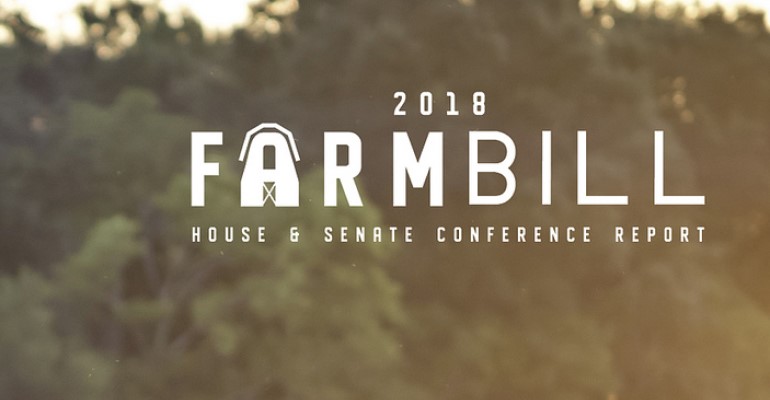
An integral part of the oversight and review process for future farm bills is getting direct input from producers, stakeholders and consumers on how various programs are working for them. For the last nearly 100 years, the farm bill has provided government support in many different ways to farmers.
The Senate Agriculture Committee has held two farm bill field hearings in the home districts of Chairwoman Debbie Stabenow, D-Mich., and ranking member John Boozman, R-Ark., The House Agriculture has also now begun to hold several listening sessions in member districts, including initial ones in Arizona, California, Washington and another planned for Minnesota.
House Agriculture Committee Republican Leader Glenn "GT" Thompson and Chairman David Scott are pleased to offer the opportunity for members of the public to submit their feedback and ideas for the 2023 Farm Bill through an online form available here.
"It is critical we receive feedback from farmers, ranchers, producers, and families nationwide as the 2023 Farm Bill draws nearer. Hearing directly from farm country about what’s working and what’s not is the only way to ensure we craft a bill that meets the needs of rural America," says Thompson.
"This is a chance to hear directly from farmers, ranchers and foresters across the nation who utilize our farm bill programs to make sure we are prioritizing their needs as well as the needs of the nutrition, research, and rural development communities," adds Scott. "I strongly encourage all who are interested to share their input on how the 2018 Farm Bill is or is not meeting their needs, so that we, at the House Agriculture Committee, can craft a strong farm bill and best meet the needs of people."
Farm bill priorities formalizing
The current farm bill expires September 30, 2023. “To prepare for the 2023 farm bill, discussions about how best to address the issues of agriculture have already begun. These will be especially important given what the agriculture sector has been up against over the past few years and the various unknowns farmers and ranchers face,” explains Shelby Myers, American Farm Bureau Federation economist and a great Market Intel primer: What is the (Food and) Farm Bill and Why Does it Matter?
Agricultural groups are starting to begin outlining their key priorities for the farm bill debate process, including a likely overall increase in overall spending for the next farm bill based on what they see is a challenging economic and geopolitical environment.
Many similarities are already seen in commodity groups calling for more tweaks to Title 1, continuing the voluntary, incentive-based flexible approach to conservation programs, protecting against cuts in crop insurance and enhancing USDA’s market access and development programs to enhance trade.
The American Soybean Association shared their soy industries 2023 Farm Bill priorities at the end of May. Among the priorities include improving the Title I farm safety net for soybeans, building biobased and biofuels opportunities and ensuring broadband coverage is accessible throughout rural America.
ASA says it’s steps for determining its farm bill principles began internally with education sessions for farmers serving on the ASA Board of Directors and soy state affiliates to hear more about the various titles included in the farm bill. ASA then worked in conjunction with allied soy groups United Soybean Board and U.S. Soybean Export Council to distribute a widespread survey to farmers. Finally, ASA hosted a series of 12 listening sessions, by both titles and geographic regions, in which farmers and states could share input – or follow up by comments submitted to ASA staff. These priorities will be refined into more specific requests by early 2023, ASA says.
The National Association of Wheat Growers released their 2023 Farm Bill priorities, which highlight the need to protect crop insurance, support financial and technical assistance through voluntary conservation programs and increasing the reference price for wheat in Title 1.
“NAWG has been actively seeking farm bill feedback through our grassroots network and various outreach tools, and we will continue to refine these priorities in the coming months,” says NAWG President and Washington state wheat grower, Nicole Berg.
Jennifer James, a rice farmer from Newport, Arkansas, and member of the USA Rice Farmers Board of Directors, testified at the Senate Ag field hearing in Arkansas regarding priorities for the commodity, conservation, trade and crop insurance titles.
Related: Senate ag leaders hold Arkansas farm bill field hearing
“Title I, specifically the Price Loss Coverage program, is really our true safety net, and is critically important because it levels the playing field for rice that is highly subsidized by our global competitors,” James said. “Unfortunately, PLC is no longer adequate. Reference prices do not provide the level of assistance needed for an effective safety net for rice producers. Current PLC reference prices for rice were established based on 2012 costs of production.”
James also called for payment limitations to be reviewed and adjusted to reflect today’s farms.
About the Author(s)
You May Also Like






